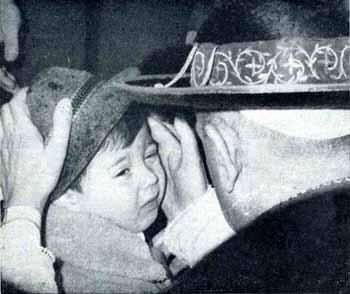 |
What People Are Asking
Humanae Vitae, Not a Good Guide for Couples
Fr. Paul Sretenovic
In order to give orientation to couples, it came to my mind to write an article concerning Paul VI’s Encyclical Humanae vitae. Then, I noted the comments of a reader posted on Tradition in Action that seemed to defend Paul VI: “After all, he gave us this encyclical, so he could not be all bad, could he?” The post did not represent the website, but was simply an opinion in the section “What People Are Commenting.” This encouraged me to deal with the topic, because I do not believe that encyclical was good, even though it reached the correct conclusion of condemning artificial contraception.

Children did not benefit from Paul VI's new approach on conjugal life |
I believe that a number of people, including many Traditionalists, are ill-informed regarding the dangers for conjugal relations created by the encyclical, even among those who are trying to be faithful to the Church’s Magisterium.
My purpose presently is not to do a detailed study of the encyclical. For that, I highly recommend a study on the deficiencies in Humanae vitae written by Mr. John Galvin (here). I have read it as well as several other articles by Mr. Galvin published some time ago in the Latin Mass Magazine just before I was ordained a priest, and they were a bombshell for me.
Since then, I have come to see a bit better “the big picture,” which tends to put what I have learned in the past into perspective. This perspective, I hope, will show that, while the conclusion of Humanae vitae is correct, it is not to be trusted as a guide for married couples who are trying to fulfill the primary purpose of Matrimony as instituted by God: the procreation and education of children.
For that, Holy Mother Church has ample resources for one to peruse, not least of which is Pius XI’s Encyclical Casti connubii. In hindsight, one sees that the Church has always suffered pressure to break with her past moral rigor. Today, when people have forgotten the eternal truths, the answer is not to invent something new in order to placate them. It is to reapply the Church’s age-old wisdom to reconnect people with a past that they have lost, yet so desperately need if they are to return to the right path, please God, and save their souls.
When I think back on my seminary days, I remember Pope Paul VI as a kind of enigma. How could the same Pope who gave the world Humanae vitae in 1968 also give it the Novus Ordo Missae in 1969? On the one hand, Paul VI, as I perceived it, tried to put the brakes on the sexual revolution by saying “no” to artificial contraception. On the other hand, he opened the doors for revolution in the Church by casting aside centuries of Tradition in the Liturgy.
The Mass is the expression of the Catholic Faith. All of the truths that God has revealed to man are summarized in the Mass. Therefore, if the Church can change the Mass, then she can change her very identity. Given that the Mass, indeed, changed in 1969, this seemed to me a contradiction because just one year before the integrity of Morals had been preserved, I believed, by Humanae vitae.
Why bother doing this if, in the next stroke of the hand, the Pope would undermine the very foundation of immutable truth? In retrospect, years later, I have come to realize that these two actions are not actually a case of the Holy Father in a Dr. Jeckyl and Mr. Hyde behavior. No matter how different at first glance the two may seem, Humanae vitae and the Novus Ordo Missae do indeed proceed from the same mentality – from a rupture with the past.
Humanae vitae is based in subjectivism
How does this apply to the case? Well, as it turns out, while Humanae vitae and the Novus Ordo do objectively keep intact the “one thing necessary”- official Church teaching on contraception and Transubstantiation, respectively - they both substantially represent a new way of thinking, which undermines the previous teaching. In this, the Novus Ordo Missae is probably a graver example because it is, in and of itself, a violation of Church tradition and teaching against Protestantism, whereas Humanae vitae lends itself towards disobedience by being gravely deficient in its reasoning.

Above, a large American Irish Catholic family in 1965, the McCabes. Families became less numerous after Humanae vitae |
Humanae vitae, while concluding that artificial contraception is always wrong, used a completely new line of arguments, supposedly more consonant with the thinking of modern man, to prove its point. The approach that the Holy Father used was “pastoral” in the “spirit of Vatican II.” Apparently he believed that using traditional arguments would not ensure obedience to the Natural Law.
When reading Humanae vitae, one becomes convinced that the Pope – to please his critics – admits that having babies is a “problem” rather than a blessing. Therefore, according to him, the Church’s entire approach must change with the times to meet the new thinking of modern man.
Like Mr. Galvin, I believe that this subjectivism removed the rational foundation for the perennial teaching of the Church regarding contraception. The nature of this intellectual void is such that, while not directly contradicting the past, it leaves the past behind as if “all that” was good only for the people of that age. This is the presupposition of Modernism and Progressivism, which admit the “historic method” of interpretation for everything and, therefore, a changing Faith and Morals. Progressivism does not directly contradict past Catholic teaching. It ignores it.
Far from helping “modern man” to embrace Church Morals, the Encyclical’s subjectivism produced a disaster: Over 80% of Catholic married couples either continued or began to use artificial birth control. When the basis for obedience to Morals is subjectivism rather than an objective norm, it opens the door for loose interpretations of “grave necessity” when it comes to “responsible parenthood” as applied to birth regulation. Hence, in Humanae vitae the acceptance of the "responsible parenthood" - today we call it Natural Family Planning - as a norm for determining the size of families is, in fact, the affirmation that one should not leave new births to the discretion of Divine Providence.
The same spirit inspired Humanae vitae and the Novus Ordo
Similarly, the Novus Ordo Missae, while keeping intact the outcome of the Consecration of the bread and the wine (at least in many cases), changes the Mass to supposedly lead “modern man” to a more “active,” and therefore, presumed “real” participation in it. In the process, the traditional language and structure of the Mass were done away with, leaving a spiritual void in its wake. The nature of this void is quite similar to that which was mentioned above concerning the intellectual void left by Humanae vitae.

With the Novus Ordo priests lost the dignity of their ministery |
The New Mass, while not directly contradicting the truths of the Faith contained in the Tridentine Mass, removed a number of them and replaced them with ambiguous prayers. From this came the loss of the sense of sacrifice - the renewal of the Sacrifice of Calvary - as well as the correspondent dignity of the ministerial priesthood. It also lessened respect for the Blessed Sacrament, soon leading to the sacrilegious practice of Communion in the hand.
The loss of the principal goal of the Mass, which is the Sacrifice of Calvary, is correspondent to the loss of the principal goal of marriage, which is to have children according to the will of God.
In Humanae vitae the elimination of the distinction between the primary and secondary ends of marriage - procreation and mutual support - leads to the subsequent focus on Natural Family Planning. Analogously, the New Mass inverted the primary and secondary ends of the Mass - Sacrifice and Communion.
Similar, therefore, to the aftermath of Humanae vitae, the result of such a “pastoral imperative” as the New Mass was the opposite of what one would hope that the Pope intended. Over 75% of Catholics stay away from attending Sunday Mass, or, in greater numbers, simply lost interest and stopped going, maybe never to come back.
Therefore, no matter how different one may believe Humanae vitae and the Novus Ordo Missae are, if we follow Our Lord’s statement, “By their fruits, you will know them,” it becomes clear that both originate from the same progressivist tree.
This constant concern to adapt Catholic Morals and Liturgy to the modern man has proved to be wrong. Even if such adaptations can seem successful at the moment, with the passing of the time they are abandoned by the people. To have the authority come down to their level or to have moral norms that please them does not convince men of good will. What convinces them is to hear the truth.
If the sound principles of the Gospel of Our Lord Jesus Christ are preached without compromise, they will attract people, who will understand that we are in this life to please God, not ourselves, and therefore, they need to make sacrifices to deserve a better life for all eternity.

Posted November 23, 2009

Related Topics of Interest
 Homosexuality, the End of the State & Humanae Vitae Homosexuality, the End of the State & Humanae Vitae
 Babies, Marriage and Progressivism Babies, Marriage and Progressivism
 Humanae Vitae Was Based on the Commission's Minority Report Humanae Vitae Was Based on the Commission's Minority Report
 Birth Control in the Spotlight Birth Control in the Spotlight
 A Refresher on Catholic Teaching about Marriage A Refresher on Catholic Teaching about Marriage
 Social Relations between Married Persons and Friends of the Other Sex Social Relations between Married Persons and Friends of the Other Sex

Related Works of Interest
|
|
Morals | Religious | Home | Books | CDs | Search | Contact Us | Donate

© 2002-
Tradition in Action, Inc. All Rights Reserved
|
 |
|